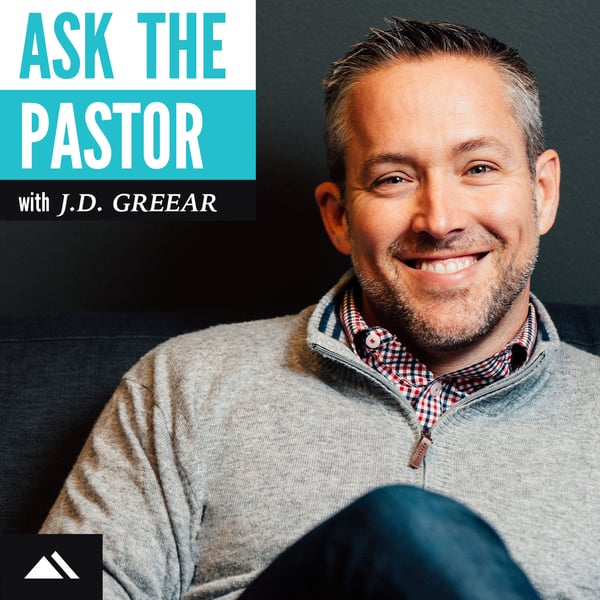How Important Is Correct Doctrine?
Ask the Pastor with J.D. Greear
J.D. Greear
4.9 • 624 Ratings
🗓️ 18 April 2022
⏱️ 12 minutes
🧾️ Download transcript
Summary
Show Notes:
We’ve talked before about separating out doctrinal issues by order of importance, but I want to hone in on that to answer this question.
An Australian theologian named Michael Bird identified three levels of beliefs in the church—I’ve found this really helpful:
Category (1) Matters essential for salvation. (think: the doctrine of Christ, the way of salvation)
Category (2) Matters that are important to the faith and the integrity of the church. Though not necessarily essential for salvation like category 1 issues (think: inerrancy of the Bible; our understanding of sexual morality and gender and marriage, which are very serious issues.) Categories 1 and 2 are things Paul would tell us to divide over. (By the way, what to believe about items in these 2 categories are almost always spelled out clearly in Scripture)
Category (3) Matters of indifference. These are debatable things, preferences, convictions about the best application of Christian principles, and political philosophies. We’re not saying there is no right and wrong in this category, just the importance of agreement in these things does not rise to a category 1 or 2 level. Paul refers to this as “disputed matters.”
So to your question about when to approach someone on these issues, I think it’s always fair to have discussion about theological differences. This can help you catch onto the other person’s point of view while explaining yours.
But I definitely think it’s important to talk about first-order issues with friends and family who claim to be believers. In fact, that’s the most loving thing you could do. Because while it feels good to claim to be a Christian and to not have to believe any of the hard teachings, that’s a false sense of security and it is out of a place of love.
And that gets to the how question: you should always do this out of a place of love for the other person, you should always do it respectfully, you should always let them present their point of view… but you should also be clear about what Scripture says.
Pastor J.D. referenced an article by Justin Taylor, linked HERE.
Want to ask J.D. a question? Head to our Ask Me Anything hub to submit your question.
As always, don’t forget to rate and review this podcast!
Find Pastor J.D. on Twitter, Instagram, and Facebook.
Transcript
Click on a timestamp to play from that location
| 0:00.0 | Hey, everybody. |
| 0:17.1 | Hey, everybody, welcome to Ask Me Anything. |
| 0:19.7 | I'm Matt Love, and this is the podcast where Pastor J.D. Greer gives quick answers to some of your toughest theological, ethical, leadership questions. |
| 0:28.2 | Today, our question comes from one of our listeners named Landon, and I have to admit, this is one I've asked before, and I have heard other people ask this question in some |
| 0:39.0 | form. So this is a good one for us to hear what Pastor J.D. has to say, because I think |
| 0:43.6 | we're all asking this. So the question is this, how concerned should we be with Christian |
| 0:49.2 | family or friends who muddle doctrine? Maybe they have different beliefs around issues like homosexuality or |
| 0:56.8 | who can be an elder or how you would get to heaven. But they've been saved and baptized. They're a |
| 1:01.6 | believer, but they just have different theology than we have. Should we approach them about |
| 1:06.8 | issues of doctrine? And if so, how do we do that? So, J.D., what do you think? |
| 1:10.6 | Landon, that is a fantastic question. And one I think is really relevant for a lot of us, |
| 1:15.1 | because a lot of us have friends and family that believe differently about various things. |
| 1:20.2 | And so we wonder, like, what's the right way to do this? The short answer is, yes, |
| 1:23.8 | you always should. I mean, Paul wrote his epistles to try to help correct doctrinal |
| 1:29.4 | error and the more serious, the doctoral error, the more he kind of leaned in on it. But I do think |
| 1:33.8 | you have to develop a grid for understanding the relative importance of different things. And not |
| 1:39.2 | everything is a salvation issue. And some of them while being critical to salvation. Others are not critical to that. |
| 1:48.0 | So let me go back to something we've actually talked about here before in this program and let me |
| 1:51.1 | expand it. Landon, I hope you're okay with this. I'm going to use your question to expand it just a |
| 1:56.3 | little bit into saying how do we think about people who disagree with us. Michael Byrd is a theologian. |
| 2:02.4 | And by the way, I don't agree with everything Michael Bird says. So this is a good, a good thing for me |
| 2:06.0 | to use from him because there are things that he and I would not agree on. But he talks about, |
... |
Please login to see the full transcript.
Disclaimer: The podcast and artwork embedded on this page are from J.D. Greear, and are the property of its owner and not affiliated with or endorsed by Tapesearch.
Generated transcripts are the property of J.D. Greear and are distributed freely under the Fair Use doctrine. Transcripts generated by Tapesearch are not guaranteed to be accurate.
Copyright © Tapesearch 2025.

